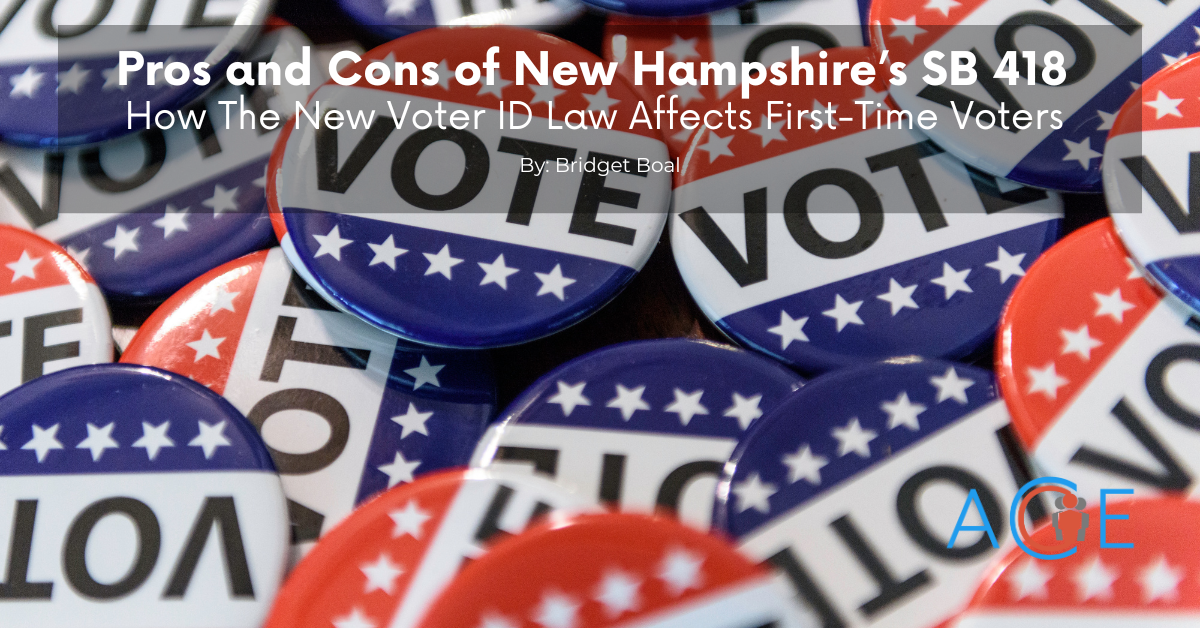What is SB 418?
On June 16, 2022, New Hampshire Governor Chris Sununu signed a new piece of voting legislation: Senate Bill 418. Before SB 418, first-time voters who could not provide documents proving their identity at a polling place could still cast a ballot by signing a Qualified Voter Affidavit under oath. SB 418 eliminated the Qualified Voter Affidavit, requiring first-time voters to fill out a provisional ballot if they are unable to submit proof of identity. Under SB 418, a voter’s provisional ballot will only be counted if they submit proper identification documents to the Secretary of State within seven days of the election date. If the required documents are not submitted on time or do not correctly verify the voter’s identity, the provisional ballot is not counted.
Arguments in favor of SB 418
Proponents of SB 418 argue that the bill marked a necessary step towards election integrity. They say the prior system invoked a degree of trust in the individuals who signed the Qualified Voter Affidavit and argue that SB 418 eliminates the potential for false testimonies of identity or residency. Supporters cite several instances of election fraud in New Hampshire since 2016 as the basis for their support of the bill. A spokesman for the state Attorney General emphasized that New Hampshire elections are sometimes determined by a small number of votes, so any instance of fraud can be detrimental to the validity of elections.
Supporters also argue that SB 418 strengthens collective trust in elections. They claim that the bill implements a system that is already widely supported, seeing as one poll predicts that 79% of Americans support photo ID requirements to vote. Additionally, given that several other states have already implemented similar strict voter ID policies, supporters claim that SB 418 is not a departure from popular norms across the country.
Arguments against SB 418
Critics of SB 418 contend that the bill places an unnecessary burden on voters who may not have the financial means or accessibility to provide documentation of their identity. They highlight that obtaining an ID involves costs associated with document copies, postage, and having a permanent address. Thus, opponents argue that SB 418 suppresses voting access for individuals who may not have access to photo identification, such as the homeless or new citizens of the state. Further, opponents assert that New Hampshire had not experienced sufficient voter fraud to merit a change in voting laws.
Critics also contend that SB 418 risks violating voter privacy. Under SB 418, provisional ballots must be verified by election officials once the voter has submitted the correct documents. Opponents argue that giving government officials access to an individual’s voting preferences is an unconstitutional violation of the right to privacy. Additionally, opponents argue that SB 418’s procedure for ineligible provisional ballots risks divulging private information to the general public. Under SB 418, once a ballot is determined to be ineligible due to failed identity confirmation, the ballot is then released as public knowledge. Critics of the bill warn that this violates the right to a secret ballot, pointing to a few cases where voters’ publicly released ballots could easily be traced back to them.
ConclusionWhile SB 418 is still in effect, it has been met with several legal challenges. Two previous lawsuits by voter advocacy groups that were dismissed on procedural grounds are now being appealed to the New Hampshire Supreme Court. Moreover, in April, a judge denied the state’s motion to dismiss a lawsuit brought forward by the Democratic National Committee. These cases represent the core topics surrounding SB 418, including election security, voter privacy, and equal voting access. Despite the legal challenges against SB 418, efforts to regulate elections continue to emerge in New Hampshire; the legislature has proposed a new bill requiring proof of citizenship prior to voting.


